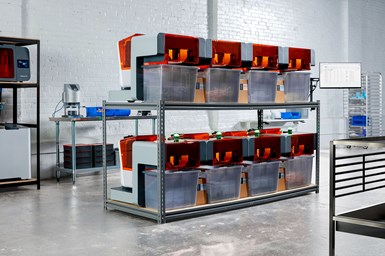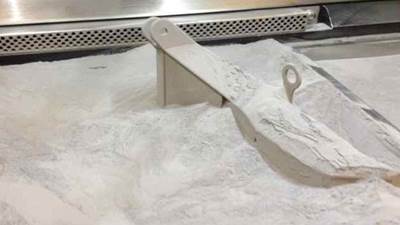Formlabs’ Automation Ecosystem Enables Automated 3D Printer Fleets
The Form Auto, Fleet Control software and High-Volume Resin System features enable users to increase 3D printing output, thereby reducing cost per part without adding operational complexity.
The Automation Ecosystem reduces the amount of operator labor and minimizes idle printer time for 24/7 printing. Photo Credit: Formlabs
Formlabs’ Automation Ecosystem is said to enable new levels of 3D printing productivity with features such as Form Auto for back-to-back throughput, Fleet Control for advanced fleet management and a High-Volume Resin System for high-capacity printing.
The company says the Automation Ecosystem reduces the amount of operator labor and minimizes idle printer time with 24/7 printing so users can efficiently produce end-use parts, prototypes and customizable products at a lower cost-per-part. The system also has the ability to produce back-to-back prints nonstop without an operator.
Formlabs says it makes 3D printing affordable and accessible, enabling leading companies in a variety of industries to innovate new product designs, test prototypes, manufacture purpose-built tools and customize products. The Automation Ecosystem can foster new innovations by enabling easy expansion from one Form 3+ or Form 3B+ 3D printer to a scalable fleet of 3D printers.
As users scale their 3D printing production from one to multiple printers, the Automation Ecosystem is said to make the transition easy without adding management complexity. With the ability to manage multiuser, multimaterial printer fleets, the system enables continuous production, so users can send multiple prints to run overnight and into the weekend.
Together with Formlabs 3D printers, the company says the Ecosystem provides a three-time increase in productivity while saving up to 80% on labor, lowering cost per part by 40%, and reducing packaging waste up to 96%.
The Formlabs Automation Ecosystem features include Form Auto which Form Auto enables automated 24/7 printing with automatic part removal, so users can level up production and reduce labor. When parts are complete, Form Auto seamlessly removes finished parts from the Build Platform 2 using the Quick Release Technology, and starts the next print in the queue as soon as possible. The hardware extension works with Form 3 or Form 3+ 3D printers.
The Fleet Control feature simplifies advanced 3D printer fleet management, optimizing workflows to maximize fleet productivity. It’s a suite of new features within Formlabs’ Dashboard and PreForm software that includes centralized queue management and automatic printer assignment to optimize production, performance and printer efficiency with Form 3+, Form 3B+, Form 3L and Form 3BL printer fleets.
The High-Volume Resin System feature enables users to increase resin capacity to five liters, which is five times the standard cartridge size, enabling users to create more parts with fewer interruptions for cartridge replacements. This system streamlines workflows, with consistent resin dispensing with a resin pump while reducing downtime and user intervention to change cartridges, as well as packaging waste. This is compatible with the Form 3+, Form 3B+, Form 3L and Form 3BL.
“The Formlabs Automation Ecosystem is a seamless solution for ramping up production with 3D printer fleets, staying true to the ease of use of all Formlabs products, so anyone can make anything,” says Dávid Lakatos, Formlabs chief product officer. “These solutions will enable companies such as dental labs, service bureaus and internal job shops to ramp up production without increasing labor requirements or expensive capital investment, making 3D printing for production more cost-effective.”
- Learn how Formlabs’ educational platform aims to advance dental 3D printing.
- Read about Formlabs’ curated set of printing tools for simplifying postprocessing and cleaning to quickly and easily 3D print high-quality parts.
Related Content
Carnegie Mellon Helps Industry, Students Prepare for a Manufacturing Future with AM and AI
Work underway at the university’s Next Manufacturing Center and Manufacturing Futures Institute is helping industrial additive manufacturers achieve success today, while applying artificial intelligence, surrogate modeling and more to solve the problems of the future.
Read MoreCopper, New Metal Printing Processes, Upgrades Based on Software and More from Formnext 2023: AM Radio #46
Formnext 2023 showed that additive manufacturing may be maturing, but it is certainly not stagnant. In this episode, we dive into observations around technology enhancements, new processes and materials, robots, sustainability and more trends from the show.
Read MoreThe Top 10 Additive Manufacturing Stories of 2024
Defense, space exploration, thermal management — these are some of the topics that captured the Additive Manufacturing audience’s interest in 2024. But there’s also an overarching theme: Don't wait for additive manufacturing to be perfect. Instead, leverage the applications perfect for AM.
Read MoreSemiconductors, Tungsten, AM Affordability and More from Formnext 2024: AM Radio #56
The trade show included increased applications for the semiconductor market, machine launches and technology advances aimed at cost cutting, plenty of LFAM and more. Listen to our conversation on Formnext 2024.
Read MoreRead Next
Postprocessing Steps and Costs for Metal 3D Printing
When your metal part is done 3D printing, you just pull it out of the machine and start using it, right? Not exactly.
Read More3D Printed Polymer EOAT Increases Safety of Cobots
Contract manufacturer Anubis 3D applies polymer 3D printing processes to manufacture cobot tooling that is lightweight, smooth and safer for human interaction.
Read MoreCrushable Lattices: The Lightweight Structures That Will Protect an Interplanetary Payload
NASA uses laser powder bed fusion plus chemical etching to create the lattice forms engineered to keep Mars rocks safe during a crash landing on Earth.
Read More





















